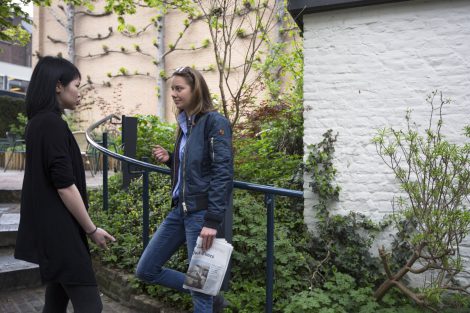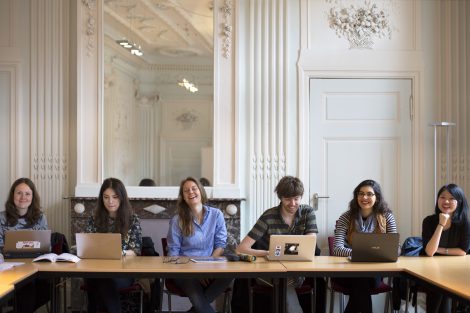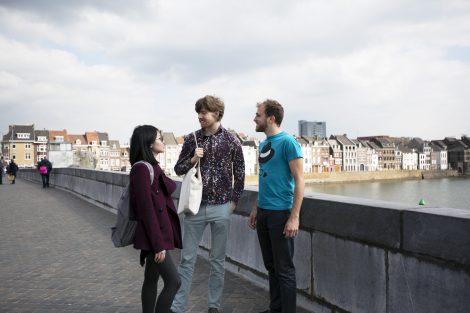Science and Public Policy
One of the most striking developments of contemporary governance has been its increasing engagement with the world of science. This is no longer restricted to the special domain of research and development policy where public authorities seek to promote scientific and technological innovations themselves. By now nearly all domains of public policy-making have become profoundly “scientized”, No matter whether it concerns climate, medical therapies, the treatment of sexual delinquents, the regulation of financial instruments, combatting poverty or aiding developing countries – there is barely any area where policy-makers do not base their decisions on the advice of some sort of scientific or professional experts. At the same time, scepticism vis-à-vis expertise has also been rising, and worries about “alternative facts” and “post-truth society” have caused new uncertainties about who has the authority to speak to politics. The evolution, structure and wider social implications of this tightening science-policy nexus are the theme of this specialisation.

What are the institutional channels through which science is articulated and incorporated into policy-making processes? How does this influence the relations of power under which policies are negotiated? How does science achieve and maintain its credibility in the policy arena? And how does all of this work back into the organisation, research agendas and methods of science themselves? By addressing these and related questions, this specialisation provides students with the reflective resources necessary to understand and scrutinise the ways in which public policy operates under the conditions of an emerging knowledge-society. This specialisation prepares students for a broad spectrum of professional functions related to the formulation, execution, and consequences of science-based policies.
To address these issues, the specialisation combines insights and methods from science and technology studies with those from related fields of public policy analysis (political science, political sociology, institutional economics). The specialisation deals with the science-policy interaction as a general phenomenon of contemporary society. It allows students to concentrate on case studies of specific interest, analysed using a mix of tools provided in lectures, seminar discussions, and assignments.
The participants in this specialisation will gain in-depth appreciation of different methods, theories, and practical tools to deconstruct complex policy choice problems and to identify and evaluate viable policy alternatives. By the end of this training module the participants will:
· Understand the various ways in which policy problems can be framed
· Be capable of applying a systemic perspective to policy problem solving
· Be capable of analytic reasoning and communication
The participants will be introduced to the various approaches, concepts, and methodologies of public-policy-analysis, and will be trained in applying them in a case-based way. At the same time, the participants will learn how to communicate their expertise concisely and convincingly.

Schedule of Introductory course
The specialisation is divided into two parts. The first part consists of five intensive weeks of lectures and seminars (February – March) during which the students become fully acquainted with the fundamentals of science-policy analysis and its implications for decision-making in various contexts of governance and organisational practice. For the remaining months of the semester, the students work on a thesis in a thematic area of their choice within the science policy-making arena. Students have their own supervisors from among Maastricht academic staff who work with them on a one-to-one basis to carve out a thesis project. Theses generally combine empirical work and theoretical reflection.
Internships
It is possible to do an internship as part of this specialisation. Internships involve thesis projects just like regular specialisations (and are graded identically) but take place outside of FASoS. The following institutions regularly take ESST interns.
- The Rathenau Institute in The Hague. The Rathenau Institute promotes the formation of political and public opinion on science and technology. To this end, it studies the organisation and development of science systems, publishes about social impact of new technologies, and organises debates on issues and dilemmas in science and technology.
- The Maastricht Sustainability Institute (MSI), at the School of Business & Economics of Maastricht University. MSI addresses complex issues facing the planet and its inhabitants. Its aims are to conduct research and provide education in the fields of integrated assessment and sustainable development.
- The Centre for Science and Technology Studies (CWTS), an interdisciplinary institute at Leiden University which studies the dynamics of science, technology and innovation.
The ESST-specialisation is also based on close collaboration with the staff members of the Spiral Research Centre at the Université de Liège, Belgium.
Students can also find and propose their own internship projects and institutions, but should be aware that these need to be of a sufficient STS character to be approved .
Language of Instruction
The specialisation is given in English. All literature for the core sessions and the sessions themselves are in English. All faculty members will use English as the medium of communication with the students throughout this course.
Minimum number of students: 4
Maximum: to be decided
Core literature
- Alasuutari, Pertti (2014): Epistemic Governance. An Approach to the Politics of Policy Making. European Journal of Cultural and Political Sociology, 1, 1: 67-84.
- Barry, Andrew (2001). Political Machines. Governing a Technological Society. London: Athlone.Bijker, W., Hendriks, R., & Bal, R. (2009). The Paradox of Scientific Authority. Boston: MIT. Pp. 1-46; (71-106); 107-135.
- Callon, Michel; Lascombe, Pierre; Barthe, Jannick (2009): Acting in an Uncertain World. An Essay on Technological Democracy. Cambridge, Mass.: MIT Press.
- Chilvers, Jason & Matthew Kearnes (eds.) Remaking Participation. Science, environment and emergent publics (pp. 32-63). London: Routledge.
- Dean, Mitchel (1999) Governmentality. Power and Rule in Modern Society. London: Sage.
- Frickel, Scott & Kelly Moore (eds) The New Political Sociology of Science (pp. 3-35). Madison: University of Wiskonsin Press.
- Jasanoff, S. (2004). States of Knowledge. The Co-production of Science and Social Order. London: Routledge.Jasanoff, S. (2005). Designs on Nature. Science and Democracy in Europe and the United States. Princeton: Princeton University Press.
- Jasanoff, S., & Kim, S.-H. (2015). Dreamscapes of Modernity. Sociotechnical Imaginaries and the Fabrication of Power. Chicago: University of Chicago Press.
- Jasanoff, Sheila & Hilton R. Simmet (2017) No funeral bells: Public reason in a ‘post-truth’ age. Social Studies of Science, 47 (5): 751-770.
- Owen, R.L. & M. Bessant & M. Heintz (eds.) (2014): Responsible Innovation. Managing the Responsible Emergence of Science and Innovation in Society. Wiliey-Blackwell.
- Voss, Jan-Peter & Richard Freeman, eds. (2016): Knowing Governance. The Epistemic Construction of Political Order. London: Macmillan . Research and Policy

Examples (past) thesis topics
· The Social Construction of the Scientific Persona of the European Commission’s Chief Scientific Advisor
· Obduracy in Maastricht Urban Parking Structure and Policy
· A Discursive History of Nuclear Energy in Belgium: from the 1950s to the present day
· An Issue Mapping of Online Engagement with Neuroplasticity
· The Role of Epistemic Communities in Setting UK Drugs Policy
· The Creation and Negotiation of Credibility Surrounding the Dutch Choices Food Label
Name and email address specialisation coordinator
Dr. Geert Somsen, g.somsen@maastrichtuniversity.nl
List of involved staff members
The staff members involved in the ESST programme participate in the Research Institute for Science and Technology Studies
Prof. Dr. Karin Bijsterveld: Sound and technology, music (classical, jazz, popular) and technology, festival technologies, noise and society, sensory design and marketing, sensory skills in the sciences, sensory museum exhibits, surveillance techniques, measurement and standardisation (in automotive industries), controversies concerning windmills, recent history of consumption product manuals, elderly health technologies, domestic technologies, architecture
Dr. Raf de Bont: History of the biological and the environmental sciences; cultures of nature conservation; animal history; science, technology and culture in the Anthropocene
Dr. Joeri Bruyninckx: Science and Technology Studies; History of science, technology, and environment;Sound studies; amateur and citizen science; time; bodily skill; cultures of work and technology
Dr. Darryl Cressman: The Philosophy of technology; actor-network theory; science and technology studies; critical theory; sound studies
Dr. Anna Harris: Ethnography, materiality, medical technologies/professionals/practices, skills, craftsmanship, hospitals, making, sensing, embodiment/body theories, history-anthropology collaborations, food, medical humanities, pneumatic tube systems
Dr. Ruud Hendriks: Artistic interventions and material design in (mental) health care; Autism spectrum disorders; Disability studies; Dementia; Empirical ethics; Expert policy advice; Health Council of the Netherlands; Science and technology studies
Dr. Anique Hommels: vulnerability, cities as sociotechnical ensembles, urban resilience, obduracy of sociotechnology, innovation management, critical infrastructures, standardisation, history and sociology of technology
Dr. Jens Lachmund: sociology and history of science and technology / medical sociology / sociology of the environment / urban sociology / nexus between expertise and governance
Dr. Vincent Lagendijk: History of technology, transnational dimensions of international rivers, history of energy/electricity, development history, international organisations, technology and race
Prof. dr. Harro van Lente: the dynamics of emerging technologies; technology assessment, foresight, politics of knowledge production; innovation management; science and innovation policy; nanotechnology; RRI; sociology of expectations; sustainability
Dr. Jessica Mesman: Patient Safety: Science and Technology Studies STS; Ethnography of Intensive Care Units; Video-ethnography; Neonatology; Decision-making processes in critical care medicine; qualitative methods
Prof. dr. Cyrus Mody: history and sociology of the physical and engineering sciences, with particular attention to the commercialization of academic research, university-industry-government cooperation, and emerging technologies such as nanotechnology
Dr. Bernike Pasveer: (postcolonial) sociology of science and technology; medical (imaging) technologies; food & care; sociotechnical doings of death & dying; travel of science/technology; qualitative methods including ethnograpy
Dr. Dani Shanley: History and sociology of recent science and technology. Focus on: The relationship between science and society, research and innovation, social movements, changing ideas about responsibility in relation to science and technology.
Dr. Geert Somsen: history of science / science and international relations / history of technoscientific imaginaries
Dr. Alexandra Supper: Science and technology studies; academic disciplines and interdisciplinarity; sound studies; science and art; academic conferences; scholarly identities; bodily practices and skills
Prof. Dr. Tsjalling Swierstra: Philosophy of Technology, NEST-ethics; Techno-Moral Change; Techno-Moral Scenarios; Hard and Soft Impacts of Technology; Public Debate; RRI
Dr. Jo Wachelder: History of the Senses, Sense Physiology, Images and Science, Food, Toys, Play, Higher Education, Generations
Prof. Dr. Sally Wyatt: science and technology studies; digital divide; e-research; scholarly information practices; health and internet; gender and technology
Dr. Ragna Zeiss: standardisation, classification, regulation and governance in/of science and technology; science-policy boundary work and knowledge brokerage; science and technology in and for development; upset(ting) boundaries around bio(logical) objects
Circumstantial information
On FASoS: https://www.maastrichtuniversity.nl/about-um/faculties/faculty-arts-and-social-sciences
On STS in Maastricht: maastrichtsts.nl
On Maastricht University: maastrichtuniversity.nl
On housing possibilities: www.maastrichthousing.com
On housing and other practicalities: www.mymaastricht.nl; https://www.maastrichtuniversity.nl/support/your-studies-begin/coming-maastricht-university-abroad/um-guesthouse
Tourist information: visitmaastricht.com